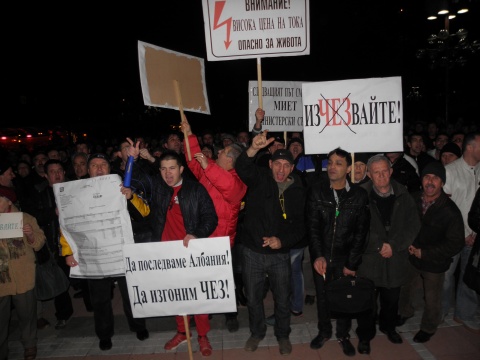
Protests against Rising Energy Prices in Bulgaria: Will Sofia Follow Warsaw and Kyiv’s Lead on Shale Gas?
Publication: Eurasia Daily Monitor Volume: 10 Issue: 29
By:

One year after the Bulgarian parliament adopted a moratorium on shale gas exploration under pressure from environmental groups, public protests against high prices of electricity and heating have swept the country. The protests, however, seem to target the energy distribution companies and their pricing policies instead of addressing the main factor for the high costs—the enormous dependence on Russian oil and gas supplies, imported at some of the highest prices in Europe.
Starting February 8, thousands of angry customers have staged daily rallies in over 16 cities, including the major administrative centers of Sofia, Plovdiv and Varna. The protests were organized through social media after consumers reported that their electricity bills for December were higher by 50–70 percent and in some cases were even double compared to the same period a year ago. Many angry customers burned their bills publicly, threatening that they would not pay (BNT, BTA, Trud, 24 Chasa, February 8–13).
On February 11, infuriated protesters threw snowballs at Energy Minister Delyan Dobrev in Sofia and then burned a dummy with his image. In Plovdiv, the crowd set fire to two vehicles owned by the power distributor EVN. In Varna, thousands of protesters blocked major intersections for hours, while the local police declared solidarity with the angered citizens (Capital, Focus News Agency, February 11).
The current protests are directed against the power distributors—two Czech companies, CEZ and Energo-Pro, and the Austrian EVN—which are accused of adding charges to consumer bills. According to CEZ and Energo-Pro, the higher bills for December are due to a longer accounting period, the cold weather, the Christmas and New Year’s holidays, and the increase in electricity prices by nearly 14 percent since July 2012 (novinite.com, February 13).
Although gas prices have risen by 12 percent compared to December 2012, pushing up electricity and heating costs, the public does not seem to demand a more comprehensive government policy to lower the costs of energy (bTV, February 1). Rather, the protesters insist on immediate measures such as the investigation of energy distributors’ price-formation practices, revoking their licenses, and re-nationalizing electricity distribution. Finance Minister Simeon Dyankov has rejected any possibility of re-nationalization, figuratively asserting that the road to nationalization leads to the GULAG (novinite.com, February 14).
The Bulgarian energy ministry initiated an inquiry into energy distributors’ pricing and ordered a full audit of their books. Prime Minister Boyko Borissov replaced the head of the State Commission for Energy and Water Regulation (DKEVR). Bulgaria’s Supreme Administrative Prosecutor’s Office also opened a probe into the legality of DKEVR’s acts as a specialized regulatory body overseeing the application of the Energy Act and related subsidiary legislation (Dnevnik, February 13, 14).
Rallies against rising energy prices have often taken place in the past three years, but this winter they appear to be larger, better organized and involving a greater number of cities. The protests seem significantly stronger than the campaign against shale gas exploration launched last year, which led to the indefinite moratorium on shale gas on January 18, 2012.
Squeezed between environmental protests against the new hydraulic fracturing technologies needed to extract cheap local shale gas and rallies against high energy prices based on expensive Russian oil and gas imports, the Bulgarian government has little space to maneuver. The next parliamentary election is fast approaching in July, and the ruling center-right party—Citizens for European Development of Bulgaria (GERB)—is threatened with further erosion of public support.
A survey in January showed that if elections were conducted at that time, 24.8 percent of voters would support the ruling party and 19.3 percent would vote for the Socialists. Four smaller parties are slated to meet the threshold requirement of four percent and make it into parliament (https://www.modernpolitics.org/?p=3382, January 30). Potential coalition permutations would leave the two major parties tied in competition to gain a governing mandate, as none would have a parliamentary majority. This means that decisions on supporting energy independence through shale gas development will be even more difficult than in the current parliament dominated by GERB. A potential Socialist-led coalition government, which traditionally cooperates more closely with Moscow, will likely stall the prospects of shale gas development.
Analysis of Gazprom’s prices in Europe since 2009 shows that the more dependent a country is on Russian gas, the higher the prices. While the UK imports only 10 percent of its supplies from Gazprom and pays $313.40 per 1,000 cubic meters, Macedonia, which is 100-percent dependent on Russian gas, buys the most expensive supplies at $564 per 1,000 cubic meters. Bosnia, which is also completely reliant on Russian gas, pays $515.2; Bulgaria pays $501 and is 90-percent dependent on Gazprom; while Poland, which is over 60 percent dependent, pays $525.5 (Izvestia, February 1). But Poland managed to negotiate a substantial discount in gas prices after initiating shale gas exploration on its territory and now pays $450 per 1,000 cubic meters of Russian gas (Spiegel Online International, February 1). According to Izvestia’s sources among Gazprom executives, all prices in Europe will go down in 2013, and the price in Poland will reach $384.
Recent shale gas exploration agreements in Ukraine, which pays $425 per 1,000 cubic meters of Russian gas, have opened new possibilities for affordable energy. Ukraine is believed to have one of Europe’s three largest shale gas reserves. In January, Ukraine signed a production-sharing agreement with Royal Dutch Shell for the Yuzivske shale gas field in eastern Ukraine, while Chevron obtained the right to develop gas deposits at the Oleske field in western Ukraine. The agreements have opened prospects for future energy independence from Russia and undermined Moscow’s attempts to exert political pressure through potential energy blackmail (see EDM, January 28).
The Bulgarian government, however, is taking palliative measures to appease the protesters—whether they are environmental groups or angry citizens paying exorbitant bills—instead of making bolder decisions to secure the country’s energy independence and open possibilities for much lower energy prices from local shale gas.




